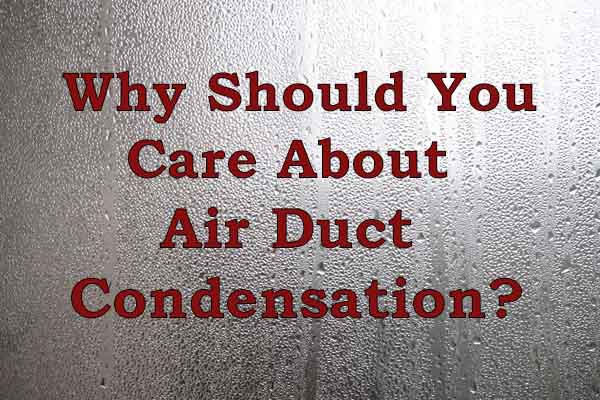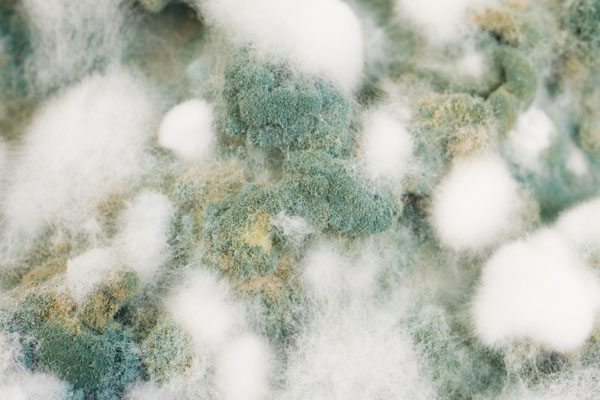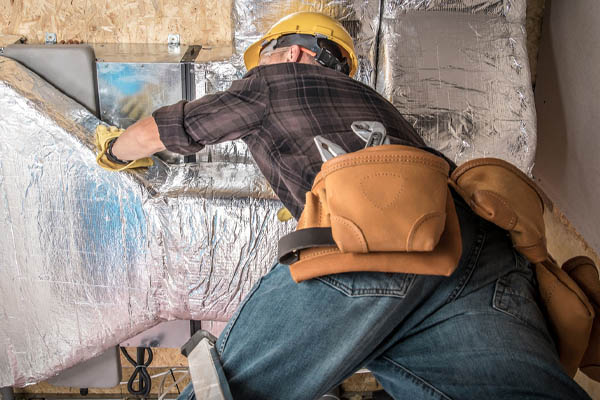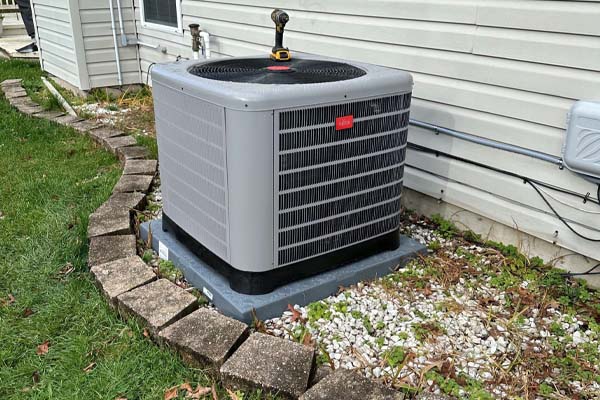Why Is Condensation On Air Ducts A Cause For Concern?

You should be concerned about HVAC air duct condensation because it can potentially cause harm to your HVAC system and indoor air quality. Moisture can build up in the vents, creating the ideal space for mold and mildew to grow. This can result in health problems and issues with air circulation. Condensation can also result in damaged ducts, lowering your system’s efficiency and causing structural issues. When you understand the causes and consequences of condensation in your ductwork, you can address the issues promptly. This will ensure that your system is healthy and functions well.
Why Should You Care About Air Duct Condensation?
Contents
Condensation on your air ducts can be concerning, but it doesn’t immediately mean it is the end of your HVAC system’s service life. There are methods available to curve the effects of condensation and protect your HVAC unit. Keep reading to learn more.
Related Article: Seek A Second Opinion Before Replacing Your HVAC System
What Is Condensation?

Condensation is when water vapor changes into liquid when it comes into contact with a cooler surface. A typical condensation example is having a cold glass of liquid on a hot day. Water drops will start forming on the outside of the glass as the cold liquid comes into contact with the glass’ exterior. This occurs because the glass is colder than the ambient air. The water vapor loses heat and changes into liquid drops. This happens because of the difference in temperature between the air and cold glass, which converts the water vapor into liquid.
The same process also occurs in your HVAC air ducts, which is why condensation happens. The cold air passing through the ducts causes it to become cold. For instance, the warm air surrounding the ducts comes in contact with the cold ducts as you use your HVAC system. This results in excess condensation on the ducts.
This is a common cause of ductwork condensation, but it isn’t the only factor to think about. Several other factors can cause condensation on your ductwork. This will be discussed later on in this article.
How Condensation Affects Ductwork

As mentioned above, condensation can harm your ductwork. Moisture accumulation on the ducts can cause several issues, including:
- Mold and Mildew Growth: An abundance of moisture can create the ideal space for mold and mildew to grow. These microorganisms can circulate throughout your house via the ducts. This can compromise the air quality in your home and may even cause health issues.
- Structural Damage: Condensation can damage the ducts over time. Moisture in the ducts can result in rusting, corrosion, and deterioration. This causes the ductwork’s structural integrity to weaken, resulting in lower airflow, air leaks, and higher energy usage.
- Reduced Efficiency: Condensation on the ductwork can interrupt the airflow. The water buildup can create blockages, hindering the efficient circulation of conditioned air throughout your home or office. This causes uneven heating or cooling, lower comfort, and increased energy consumption.
- Higher Energy Costs: The system may have to work harder to make up for the reduced airflow due to ductwork compromised by condensation. This will spike energy consumption and utility bills.
Related Article: When to Call Emergency HVAC Services
Causes of Condensation in Air Ducts

Several reasons can be behind the condensation in your ductwork. Here are several of the common causes:
- Temperature Difference: This is the most common reason for duct condensation. When the warm, humid air around the ducts comes in contact with the cool duct surface, the moisture in the air condenses and generates water droplets.
- High Humidity: Another contributing factor to condensation in the ducts is if the surrounding humidity levels are elevated. Air saturated in moisture will likely release the excess when it comes into contact with the cooler duct surface.
- Poor Insulation: Insufficient air duct insulation can result in temperature differences between the ductwork and ambient air. The temperature variation can cause condensation to appear on the duct’s surface.
- Air Leakage: Air leaks in the ducts can mean warm, humid air from the basement, attic, or crawl spaces can enter. Condensation can occur when the air temperatures mix.
- Inadequate Ventilation: When there is not enough ventilation in the ductwork, airflow can be disrupted, so stagnant air can build up. There is an increased chance of condensation occurring when there is stagnant air.
- Incorrect Duct Installation: If the ductwork is poorly designed or improperly installed, it may face problems such as temperature imbalances, air leaks, and condensation issues.
It is crucial that you identify and resolve the underlying causes of condensation. This way, you can keep moisture-related issues from occurring. Consult a licensed HVAC technician to help diagnose and fix the specific causes of condensation in your ductwork.
How To Stop HVAC Ductwork Condensation
Listed below are several practical methods you can use to prevent condensation on your air ducts:
Related Article: The Importance Of Home Air Sealing Your Home On Energy Costs
Insulate The Ductwork

Properly insulated ducts utilize insulation materials that have a high R-value. Insulation helps maintain the temperature of the duct surface, so there are fewer chances for condensation to occur. Therefore, you should ensure that you have high-quality insulation.
Seal Duct Leaks
Air leaks in the ducts can mean warm, humid air can enter. This can cause condensation. An HVAC technician can seal the leaks or gaps using metal tape or mastic sealant, ensuring your duct is airtight.
Related Article: 7 Must-Have Accessories to Improve HVAC Performance
Maintain Proper Ventilation
Ensure that your duct system has sufficient ventilation so there is proper airflow. This prevents stagnant air from occurring, reducing the likelihood of condensation. Good ventilation can be maintained when you have properly sized supply and return vents.
Control Indoor Humidity
You can control and lower indoor humidity levels with the help of dehumidifiers or ventilation systems. The recommended humidity level is usually between 30% and 50%. Make sure that the humidity level in your home is within this range to help minimize the chances of condensation in your home.
Proper HVAC Sizing

Make sure that your HVAC system is sized correctly for your home HVAC requirements. Systems that are too large or too small can contribute to condensation issues. Talk to your trusted HVAC technician to determine the correct HVAC system size that best fits your needs.
Related Article: How HVAC Comfort Zones Cut Energy Costs
Regular Heating & Cooling Maintenance
Book regular HVAC tune-ups to identify and resolve potential condensation issues early. This way, prompt repairs and adjustments can be made, and the problems don’t escalate into bigger ones.
You can minimize or remove condensation on the ducts by implementing preventative measures. These measures help ensure you have a well-functioning HVAC unit while preserving good indoor air quality. Talk to an HVAC professional regarding additional guidance that fits your specific needs.
Conclusion
Addressing the underlying causes can help prevent condensation on the ductwork. Several steps to fight these problems include ductwork maintenance, using a whole-house humidifier and dehumidifier, and installing additional insulation on your air ducts. You can successfully prevent condensation on your air ducts when you have a better understanding of what causes them and what preventative measures you can take. This way, you can enjoy efficient and reliable cooling throughout your home or office.
Related Article: Key Differences Between HEPA & MERV Filters
Call Point Bay Fuel For All Your HVAC Requirements

Point Bay Fuel is the leading provider of HVAC services in Ocean County and Monmouth County, New Jersey. Our highly skilled and professionally certified technicians are experts in heating and cooling replacements, installations, repairs, and tune-ups. Rest assured, we always deliver top-quality services to all our clients.
At Point Bay Fuel, we understand how important it is to have a comfy and energy-efficient home. This is the reason we offer highly competitive pricing for all our services. Our maintenance services are made to improve comfort and energy efficiency while reducing energy bills. If you need an HVAC repair or replacement, our knowledgeable technicians can recommend the best solution, while working within your budget. We offer a satisfaction guarantee for all our work because your satisfaction is our priority.
Call us to schedule a service appointment with us. We provide in-home estimates so you can make informed decisions about your HVAC system. Count on Point Bay Fuel to provide superior heating and cooling services! Call now!
Contact us now by calling (732) 349-5059 to speak to one of our home comfort specialists! Click the link to view our service area.
